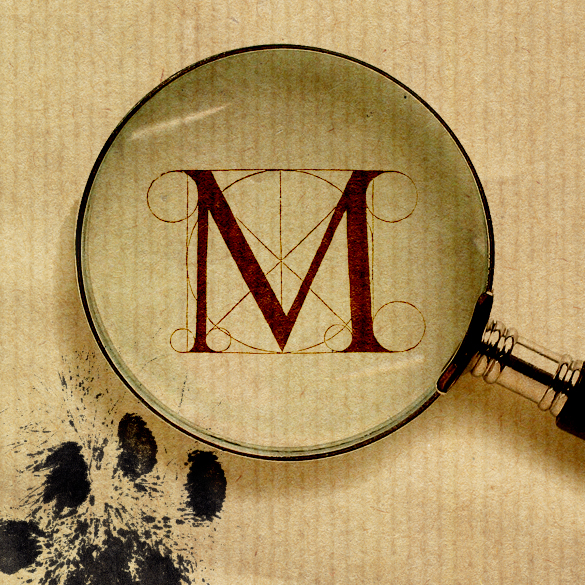Inspector M’s funeral went just as he’d expected. His former partner, W, remarked on the irony of the circumstances that led to his death. His former fiancee, T, shed consolable tears. He was interred in a modestly priced coffin purchased by the cash-strapped department. A strong contingent of unknown colleagues provided a suitably honorable sendoff in gorgeous, white-glove uniforms. His neighbor, Mrs. V, had taken possession of his cat, though she did not bring it to the ceremony. The prevailing weather continued its cool, dry streak; as a result his corpse, already dry as a bone from an austere diet, was slow in decomposing, as predicted, as though self-observant of every microbe, every gas bubble, every hungry worm.
Detectives only become famous in works of fiction; by and large they are anonymous followers of police procedure. Most crimes are just as they appear on their face—a jealous husband murders his wife, a drug addict steals for drug money, and so forth—and the official manual’s step-by-step guidelines suffice to catch them. Like painting by numbers, the manual is the template, and though the result can be a striking landscape of cruelty and debasement, it is predestined, resembling other landscapes created by other hands from the same template.
Inspector M possessed a maverick’s talent for original creation. It might be called a predilection for inspiration. As said, real life detectives never become famous, at least not publicly; they can, however, become legendary, if not well known, in law enforcement. Inspector M fit this profile from the start, from his rookie days at Troop K of the New York State Police until his well-observed death at the age of thirty five.
His powers of observational insight jumped out of the box during the very first traffic stop his trainer let him conduct on his own. To the young woman they had pulled over, Trooper M said, “You admit you ran the light but your explanation rings false. From the dilapidated condition of your old vehicle—the dents, the rust—as well as the slovenly state of affairs inside the interior, littered with fast-food wrappers and articles of clothing, including, I should add, underwear—I conclude that you are not in the habit of self discipline. The way you rolled your eyes when I stopped you—yes, I could see it in your rearview mirror—bespeaks a sense of entitlement, meaning you feel entitled to break the rules, and a person like myself, in authority, who questions said entitlement, is at best an annoyance and at worst a persecution.
“You say you could not stop due to the condition of the road, which is slightly damp, as the attempt would have caused you to skid dangerously into the middle of the intersection; therefore, you continued through the red light, judging no one to be coming from the cross-street, and so you could proceed in perfect safety. I will put aside for the moment the fact that if another vehicle had indeed been approaching the light from a cross-street, then the options you have elucidated for yourself are thus: you could either skid into the intersection and therefore collide with said vehicle, or you could do just as you did and also collide with said vehicle.
“In short, you were speeding, the proximate cause of your dilemma and, tangentially, a circumstance that utterly refutes your professed heartfelt concern for safety when approaching a red light on a wet road. To wit: if you were so concerned about said wetness, you would have been traveling some miles per hour under the speed limit, rather than the reverse.
“I’m writing you three tickets: one for speeding, one for driving in an unsafe manner due to the conditions of the road, and one for running a red light. You may need to sacrifice some minutes at the tanning salon to pay for it, as your means are limited by working, as you do, at a discount department store, the nametag for which, with your name, I can see there on the floor.”
Back in the cruiser, Trooper M’s trainer said, “You’re very observant.”
“It’s part of the job,” M said.
“True,” his trainer said. “But you didn’t need to say all that.”
His trainer cleared him for solitary patrols at the first opportunity, but one does not advance in the ranks by displaying ability on remote byways to traffic scofflaws. That is like composing symphonies for the deaf. He first came to the fore when he remarked in the presence of superiors, at the scene of an abandoned car believed to have been driven by the perpetrator of a brutal rape, that the pattern of fingerprints on the door and steering wheel indicated a left handed suspect. The crime was never solved, but his astute observation left an imprint on those in a position to matter, high rank having demanded that they turn to clay, making them susceptible to impression.
Again, in the dim apartment of a man who had gone missing, circumstances unknown, he said, again in front of superiors, “Look at that dresser; or rather, look at the handles on the drawers of that dresser.”—they were of the door knocker type—“The ones on the top drawer are polished to a high shine, the left less so than the right; the middle handles are both less shiny, the left, again, somewhat darker; on the bottom drawer both handles are nearly black, with the right one being slightly lighter. The condition of these handles, together with the nicked and scuffed appearance of the wood, indicates that the dresser has been in use for many years, that the owner was right handed, and that he either could not easily bend down, or did not care to.”
M’s observations contributed nothing to finding the missing person—an old man suffering from dementia, eventually discovered fifty miles away sitting on a curb in front of an ice cream shop—but their keenness, along with his precise delivery, went a long way to getting him noticed. His talent for identifying right or left handedness from incidental details was uncanny. In only ten years’ time on the force he found himself in an office, in Albany, at a prescreening interview for an inspector’s position.
To his interviewer he said, “You are a former college football player, for the University of Southern California, whose career was sadly cut short by a catastrophic knee injury. Your size and build, your athletic bearing, your favoring one leg, and that school ring on your finger indicate as much.”
It turned out that his interviewer was swollen from medication-induced water retention, that his uneven gait resulted from pinching shoes, and that the ring in question had belonged to his recently deceased father, who had indeed attended the University of Southern California, unlike himself. Still, M’s insights might well have been dead on, given other circumstances, and they went a long way to earning him an inspector’s badge.
The promotion spurred him to propose to his longtime girlfriend, T, the way a gambler is spurred to bigger bets after a win. She accepted. She had grown into her role as his defender to friends and loved ones. They misunderstood him, she insisted; he was a complicated man and in his own inscrutable, nearly undetectable way, sweet. She loved him quite a bit.
After a bout of lovemaking, as she lay on top of him, sticking, he said, “How is it that I know you are cheating on me? Simple. You have immediately put away your phone three times in the past week when I have walked in the room, each time claiming, rather implausibly, that it was a wrong number; you have shown an unaccountable escalation of passion for me in bed, unaccountable, that is, unless you factor in guilt; your best friend, S, claimed two days ago that she spent four hours shopping with you when I myself witnessed her driving the other way, alone in her car, on the parkway during the time in question. Yes, I notice things like that. It should not surprise you.
“Therefore I conclude that you are a despicable liar and a slut, an opinion I have been all too ready to profess, as it is obvious that the attachment of the likes of you—an unattractive, rather dull woman—for the likes of me—a notoriously difficult man, not endowed with personality or looks—has been predicated by the assumption that you simply could not do any better. From your actions, I conclude that you have found better, or what you perceive to be better, and that once you overcome your obvious guilt at reneging on your promises of undying love, you will give me, as they say, the boot. Let me save you the trouble. Leave now and never come back.”
It turned out she had been putting together a surprise party to celebrate his promotion, not easy since no one she knew liked him. She did not value, like his superiors, astute observation for its own sake. She left and never came back.
At what may not inaccurately be called the after party of M’s funeral, his colleagues reminisced about the more flamboyant episodes of his career. They indulged in remember-when.
Remember when M, seeing a brand new hairpiece and smelling “a copious application of cologne,” accused the wearer of the hairpiece and cologne of murdering his wife “in order to live like a free, promiscuous libertine,” and it turned out that she had simply died of a heart attack.
Remember when M identified a chilling pattern in a series of murders that happened around the time of three consecutive full moons, how he saw a cultish biblical connection in the victims’ names (Godfrey, Jesus, and some version of Mary, something like Marissa, maybe) and that “one must conclude that another murder will be committed on or around the next full moon and the victim will almost certainly be a Peter or Paul,” and that, not only did a dead Peter or Paul not surface at the predicted time, but by following the manual other inspectors solved the three cases independently, finding no connection between them at all, in that one was a thrill kill, the other a jealous boyfriend, and the last, Jesus, a suicide.
Remember when he got it right; that was as spectacular as it was bound to be. He’d said, “We are not dealing with students here. Though it is true that the crimes follow the school calendar, peaking during breaks in the academic year, we are not dealing with a gang of adolescents but with a single teacher. Let me explain. First there is the manner of entry through unlocked doors and windows; this suggests a patience not possessed by criminal youth. Think of how long one would need search for a suitable entry point. The fact that the perpetrator takes so much care in entering without breaking implies sympathy for the victims, of a sort, in that she—yes, we are looking for a female—does not want to burden them with the expense and bother of having to repair a broken door or window.”
W, his partner, said, “How do you know it’s a woman?”
“Yes, that. You remember when we arrived at the last residence shortly after the crime and I asked when was the last time a woman had been on site? We were told it had been at least three months. You surely did not notice—but I did—the scent of an ovulating female. Quite unmistakable.”
W said, “Are you sure about that?”
M sighed. “I am certain of it. Now, as to the fact that we are looking not just for an adult woman of child bearing age, but for a teacher. Consider where she goes inside the victim’s residences, and what she takes and, as important—maybe more so—what she does not take. She enters every room, including children’s rooms—by the way, haven’t you noticed that children live at every crime scene?—and rifles through all the drawers and closets, leaving them open and in disarray. She does not take any of the easily transportable gew gaws and gadgets that appeal to adolescents: expensive gaming equipment, music players, et cetera. Those do not appeal to her. She has instead taken loose cash, including a mason jar filled with quarters—think laundry money—as well as, among other things, an ashtray, some expensive lingerie, a paper shredder, a single set of earrings from a full jewelry box, a pair of men’s work boots, and, most telling, a book on entomology.
“We are looking for a single woman, a spinster, rather short and overweight, natural hair color most likely common brown, lively and gregarious, perceived as a simple soul, not very intelligent but dedicated to her students, not disliked but not well liked either, since her flaunted dedication puts her less desperately lonely colleagues in a poor light. She teaches no higher than the sixth grade. This is speculation, but I would wager that her beloved cat died eight months ago, approximately one month before the break-ins began.”
This time he’d hit it dead on. The burglar, on her arrest—apprehended quite by chance by a family returning home from the movies—fit all the criteria M had posited with such precision, down to the passing of her beloved cat at the time supposed. She became a local sensation: the housebreaking schoolteacher. It was the one time he got his name in the paper, his prescience leaked by a colleague to a reporter over late night drinks in a bar. Three direct quotes from an hour long interview appeared in an article in a regional newspaper. At the age of thirty five, with an eccentric manner and the confidence of a man who knows that he views the world through eyes unlike any others, and so has something uniquely valuable to contribute, he seemed to be hitting his stride.
He was working alone, his partner W having transferred away, running down a lead in the murder of a hiker on the trails. He said, “The only reason I am here is because we found your business card in the victim’s breast pocket, as though it had just been handed to him and he had not yet put it in his wallet. Perhaps he was in a hurry. Be that as it may, I accept your explanation that you had given it to him earlier that day, principally because you were seen to do just that, in public, two hours before the murder.”
“So I’m cleared?”
“Yes. There are other reasons for my conclusion.”
“Such as. . .”
“Right. Such as. . .you are known to have boarded a train to the city shortly after giving the victim your card. To have committed the crime you would have had to exit the train at one of the next three stops and taken another one back to your starting point, or perhaps you could have taken a taxi. You would have had to know that the victim was going for a hike alone on an impulse, and you would have had to know precisely what trail he was to take, and, even if you did go after him, you were not outfitted for the woods and would have stood out to any other hikers, who would have reported it.”
“Maybe he told me where he was going. Maybe no one saw me.”
“Unlikely. But, granting that, what we are hypothesizing here would be a crime at once random and expertly planned, or one could call it well conceived on the spur of the moment, in that it suggests the use of apparent randomness in service of calculation and precision. Nothing of what I observe here,”—he swung his hands to indicate the apartment around them—“leads me to conclude that you are a man capable of bold action executed with calm intelligence.
“You have lived here for ten years; you have never vacuumed; you throw dirty clothes on the floor; you fry all your food, as it is the quickest and easiest method of preparation; you drink to excess, as the only dust-free items I can see are those liquor bottles over there; you laze on your indented couch cushion watching countless hours of television, that most absent minded of all endeavors; you’ve had the same job for twenty years, and that, along with living here for ten, bespeaks a timidity not at all consistent with bold action; you do not know women, and haven’t for years, your high-strung narcissism in prodding me for the root of my conclusion being a dead giveaway for unwanted celibacy, besides the obvious; your only concern is your job, since it is all you have, the way other men have wives and children, which is why you took the time to buttonhole a complete stranger, pitching your products on your day off; you are a member of the harmless, silent masses, meekly living your life and waiting to die.”
“It’s disturbing how insightful you are.”
“Yes, I have that affect on people.”
M had observed, along with a hundred other details, that the man he was interviewing ate his meals on the couch while watching television. He observed a plate and utensils on the coffee table between them, no doubt from the previous evening’s dinner, encrusted as they were with particles of food cemented in place by dried animal fat; from the remains, he’d evidently eaten a fried steak. Left handedly. In a flash he observed that his artery must have been cut, from the thick jets of blood streaming from his chest. The unsanitary steak knife would likely cause infection, a concern clearly becoming moot with each pulse of blood, hot between his fingers.
He knew, from what he already knew, precisely how his funeral would play out. W, his former partner, would remark on the irony of the circumstances that led to his death (from the semi-hallucinatory confession of his murderer). His former fiancee, T, would shed easily consolable tears. The department would buy him a modestly priced coffin for reasons of budget. They would make a spectacle of him, the brave hero dying in the line of duty, marching a gang of dress uniforms in front of the press. His neighbor, Mrs. V, would have taken custody of his cat. The prevailing weather, if it continued, in concert with the desiccated condition of his body, not only in death but in life, would assure that he would take a long time to decompose. He would go to heaven, or at least someplace different, or maybe he would be reborn as something better or worse. He did not experience a single twinge of pain. Not one animal neuron fired to disturb his thoughts. Now that was a detail worth noting.
—
James Alexander’s work has previously appeared in Gadfly and can also be found online at Unlikely Stories, Sleet, BULL, Wilderness House Literary Review, and elsewhere.



